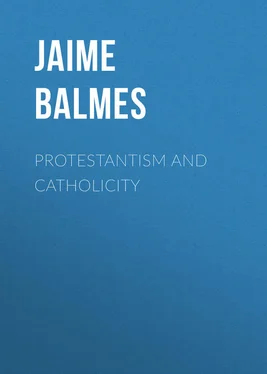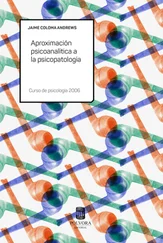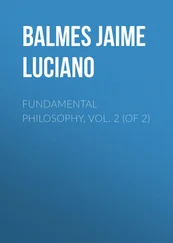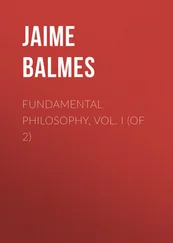Jaime Balmes - Protestantism and Catholicity
Здесь есть возможность читать онлайн «Jaime Balmes - Protestantism and Catholicity» — ознакомительный отрывок электронной книги совершенно бесплатно, а после прочтения отрывка купить полную версию. В некоторых случаях можно слушать аудио, скачать через торрент в формате fb2 и присутствует краткое содержание. Жанр: foreign_antique, foreign_prose, на английском языке. Описание произведения, (предисловие) а так же отзывы посетителей доступны на портале библиотеки ЛибКат.
- Название:Protestantism and Catholicity
- Автор:
- Жанр:
- Год:неизвестен
- ISBN:нет данных
- Рейтинг книги:3 / 5. Голосов: 1
-
Избранное:Добавить в избранное
- Отзывы:
-
Ваша оценка:
- 60
- 1
- 2
- 3
- 4
- 5
Protestantism and Catholicity: краткое содержание, описание и аннотация
Предлагаем к чтению аннотацию, описание, краткое содержание или предисловие (зависит от того, что написал сам автор книги «Protestantism and Catholicity»). Если вы не нашли необходимую информацию о книге — напишите в комментариях, мы постараемся отыскать её.
Protestantism and Catholicity — читать онлайн ознакомительный отрывок
Ниже представлен текст книги, разбитый по страницам. Система сохранения места последней прочитанной страницы, позволяет с удобством читать онлайн бесплатно книгу «Protestantism and Catholicity», без необходимости каждый раз заново искать на чём Вы остановились. Поставьте закладку, и сможете в любой момент перейти на страницу, на которой закончили чтение.
Интервал:
Закладка:
Undoubtedly, Protestants will reproach Catholics with the number of visionaries who have existed in the Church; they will recall the revelations and visions of a great number of saints who are venerated on our altars; they will accuse us of fanaticism, – a fanaticism, they will say, which, far from being limited in its effects to a narrow circle, has been able to produce the most important results. "Do not the founders of religious orders alone," they will say, "afford us a spectacle of a long succession of fanatics, who, self-deluded, exercised upon others, by their words and example, the greatest fascination that was ever seen?"
As this is not the place to enlarge upon the subject of religious communities, which I propose to do in another part of this work, I shall content myself with the observation, that even supposing that all the visions and revelations of our saints and the heavenly inspirations with which the founders of religious orders believed themselves to have been favored were delusions, our opponents would not be in any way justified in throwing on the Church the reproach of fanaticism. And, first, it is easy to see that, as far as individual visions are concerned, as long as they are thus limited, there may be delusion, or, if you will, fanaticism; but this fanaticism will not be injurious to any one, or create confusion in society. If a poor woman believe herself to be peculiarly favoured by Heaven, if she fancy that she hears the words of the Blessed Virgin, that she converses with angels who bring her messages from God, all this may excite the credulity of some and the raillery of others, but certainly it will not cost society a drop of blood or a tear. As to the founders of religious orders, in what way are they subject to the charge of fanaticism? Let us pass in silence the profound respect which their virtues deserve, and the gratitude which humanity owes them for the inestimable benefits conferred; let us suppose that they were deceived in all their inspirations; we may certainly call this delusion, but not fanaticism. We do not find in them either frenzy or violence; they are men diffident in themselves, who, when they believe that they are called by Heaven to a great design, never commence the work without having prostrated themselves at the feet of the Sovereign Pontiff; they submit to his judgment the rules for the establishment of their orders, they ask his instruction, listen to his decision with docility, and do nothing without having obtained his permission. How, then, do these founders of orders resemble the fanatics, who, putting themselves at the head of a furious multitude, kill, destroy, and leave everywhere behind them traces of blood and ruin? We see in the founders of religious orders men who, deeply impressed with an idea, devote themselves to realize it, however great may be the sacrifice. Their conduct constantly shows a fixed idea, which is developed according to a preconcerted plan, and is always highly social and religious in its object: above all, this is submitted to authority, maturely examined and corrected by the counsels of prudence. An impartial philosopher, whatever may be his religious opinions, may find in all this more or less illusion and prejudice, or prudence and address; but he cannot find fanaticism, for there is nothing there which resembles it. 12 Конец ознакомительного фрагмента. Текст предоставлен ООО «ЛитРес». Прочитайте эту книгу целиком, купив полную легальную версию на ЛитРес. Безопасно оплатить книгу можно банковской картой Visa, MasterCard, Maestro, со счета мобильного телефона, с платежного терминала, в салоне МТС или Связной, через PayPal, WebMoney, Яндекс.Деньги, QIWI Кошелек, бонусными картами или другим удобным Вам способом.
CHAPTER IX.
INFIDELITY AND INDIFFERENCE IN EUROPE, THE FRUITS OF PROTESTANTISM
The fanaticism of sects, which is excited, kept alive, and nourished in Europe, by the private judgment of Protestantism, is certainly an evil of the greatest magnitude; yet it is not so mischievous or alarming as the infidelity and religious indifference for which modern society is indebted to the pretended Reformation. Brought on by the scandalous extravagances of so many sects of soi-disant Christians, infidelity and religious indifference, which have their root even in the very principle of Protestantism, began to show themselves with alarming symptoms in the sixteenth century; they have acquired with time great diffusion, they have penetrated all the branches of science and literature, have produced an effect on languages, and have endangered all the conquests which civilization had gained during so many ages.
Even during the sixteenth century, and amid the hot disputes and religious wars which Protestantism had enkindled, infidelity spread in an alarming manner; and it is probable that it was even more common than it appeared to be, as it was not easy to throw off the mask at a period so near to the time when religious convictions had been so deeply rooted. It is very likely that infidelity was propagated disguised under the mantle of the Reformation, and that sometimes enlisting under the banner of one sect and sometimes of another, it labored to weaken them all, in order to set up its own throne on the general ruin of faith.
It does not require a great effort of logic to pass from Protestantism to Deism; from Deism to Atheism, there is but a step; and there must have been, at the time when these errors were broached, a large number of persons with reasoning powers enough to carry them out to the fullest extent. The Christian religion, as explained by Protestants, is only a kind of philosophic system more or less reasonable; as, when fully examined, it has no divine character. How, then, can it govern a reflecting and independent mind? Yes, one glance at the first exhibitions of Protestantism must have been enough to incline all those to religious indifference who, naturally disinclined to fanaticism, had lost the anchor of the Church's authority. When we consider the language and conduct of the sectarian leaders of that time, we are strongly inclined to suspect that they laughed at all Christian faith; that they concealed their indifference or their Atheism under strange doctrines which served as a standard, and that they propagated their writings with very bad faith, while they disguised their perfidious intention of preserving in the minds of their partisans sectarian fanaticism.
Thus, listening to the dictates of good sense, the father of the famous Montaigne, although he had seen as yet only the preludes of the Reformation, said, "that this beginning of evil would easily degenerate into execrable Atheism." A very remarkable testimony, which has been preserved to us by his son himself, who was certainly neither weak nor hypocritical. ( Essais de Montaigne , liv. ii. chap. 12.) When this man pronounced so wise a judgment on the real tendency of Protestantism, did he imagine that his own son would confirm the justness of his prediction? Everybody knows that Montaigne was one of the first skeptics that became famous in Europe. It was requisite, at that time, for men to be cautious in declaring themselves Atheists or indifferentists, among Protestants themselves; and it may readily be imagined that all unbelievers had not the boldness of Gruet; yet we may believe the celebrated theologian of Toledo, Chacon, who said at the beginning of the last third of the sixteenth century, "that the heresy of the Atheists, of those who believed nothing, had great strength in France and in other countries."
Читать дальшеИнтервал:
Закладка:
Похожие книги на «Protestantism and Catholicity»
Представляем Вашему вниманию похожие книги на «Protestantism and Catholicity» списком для выбора. Мы отобрали схожую по названию и смыслу литературу в надежде предоставить читателям больше вариантов отыскать новые, интересные, ещё непрочитанные произведения.
Обсуждение, отзывы о книге «Protestantism and Catholicity» и просто собственные мнения читателей. Оставьте ваши комментарии, напишите, что Вы думаете о произведении, его смысле или главных героях. Укажите что конкретно понравилось, а что нет, и почему Вы так считаете.












